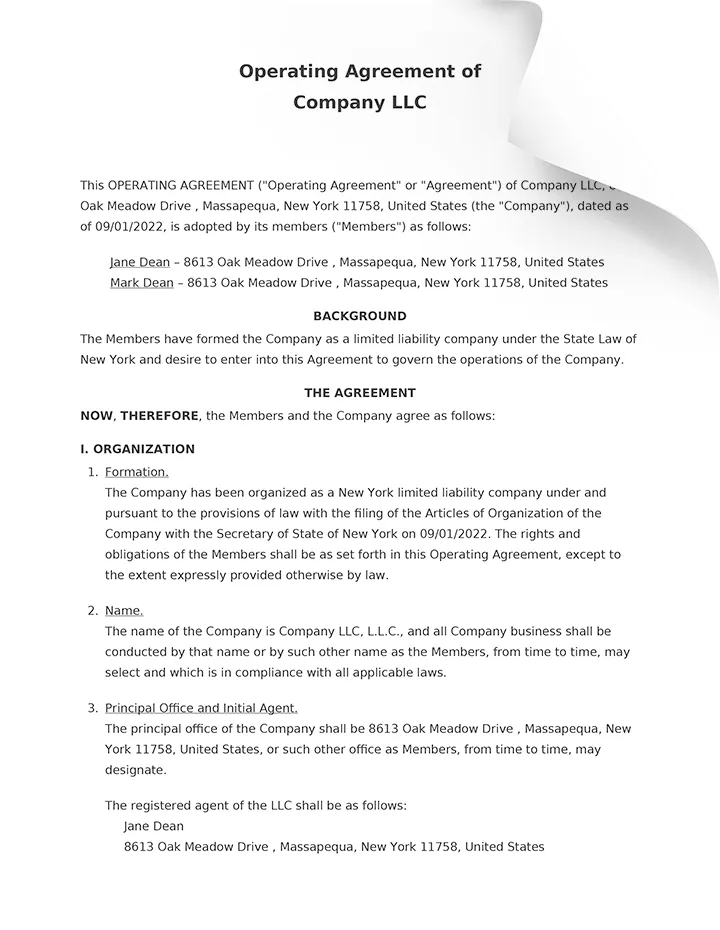A Michigan LLC Operating Agreement is crucial for anyone wanting to establish a Limited Liability Company in Michigan. It outlines the company’s structure, operations, and the rules by which it will run.
This agreement is essential for ensuring clarity among members about their rights, responsibilities, and the distribution of profits and losses.
While not legally required by the state, having a Michigan LLC operating agreement in place is highly recommended for smooth operations and conflict resolution. (An LLC is a specific form of a private limited company that combines the pass-through taxation of a partnership or sole proprietorship with the limited liability of a corporation).
What is an Operating Agreement for an LLC in Michigan?
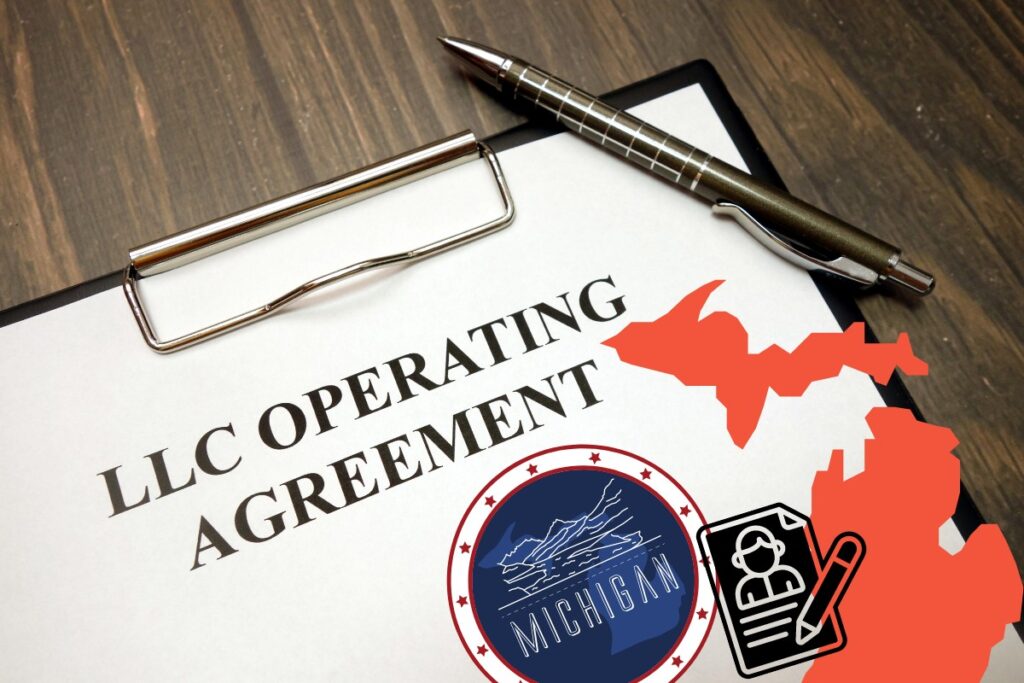
An LLC operating agreement Michigan is a vital legal document that sets out the guidelines for running a Limited Liability Company in the state. It details the ownership hierarchy, management duties, and various critical elements of the LLC’s structure.
An LLC operating agreement template Michigan is a document outlining the governance and operational guidelines of an LLC. A meticulously prepared operating agreement is essential for single-member and multi-member LLCs, ensuring transparent operations and legal safeguarding.
Here, we delve into the critical information you need to understand about operating agreements for LLCs in Michigan.
What are the Types of LLCs in Michigan?
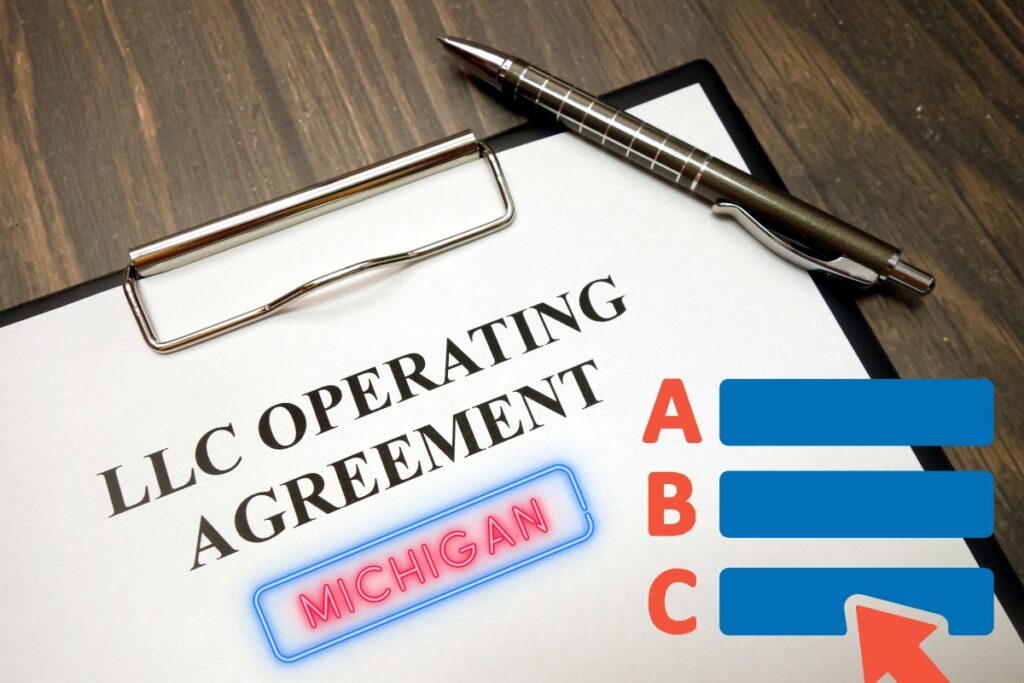
Understanding the different types of LLCs in Michigan starts with knowing what a Michigan operating agreement says. This document outlines how different forms of LLCs operate within the state. Understanding the different types is crucial for entrepreneurs and professionals looking to form a Michigan LLC.
1. General LLCs in Michigan
— Michigan General LLCs are set up according to the LLCA rules (MCL 450.4101 et seq.). They can have one or more people or companies as members (MCL 450.4506(1), 450.4102(2)(p), (s)). This flexibility makes them a popular choice for many businesses, fitting different ownership setups.
2. Series LLCs
— The LLCA does not authorize the formation of series LLCs in Michigan. This limits the structuring options for businesses seeking a series LLC arrangement within the state.
3. Professional LLCs
Professional LLCs in Michigan are designed explicitly for entities rendering professional services requiring a license or legal authorization. These services include those offered by:
- Accountants,
- Healthcare Professionals,
- Architects,
- Engineers,
- Land Surveyors,
- and Attorneys.
An essential requirement is that each member or manager must be licensed in at least one of the professional services provided by Michigan LLC (MCL 450.4904(1)). The articles of organization for a professional Michigan LLC must explicitly state its purpose and the licensure status of its members and managers (MCL 450.4903(2), 450.4904(1)).
Naming a Professional LLC
The name of a professional LLC must include “professional limited liability company” or the abbreviation “PLLC” or “PLC” (MCL 450.4903(3)). Additional naming restrictions may apply based on the profession, such as specific requirements for law and accounting firms.
Why is an LLC Operating Agreement Important in Michigan?
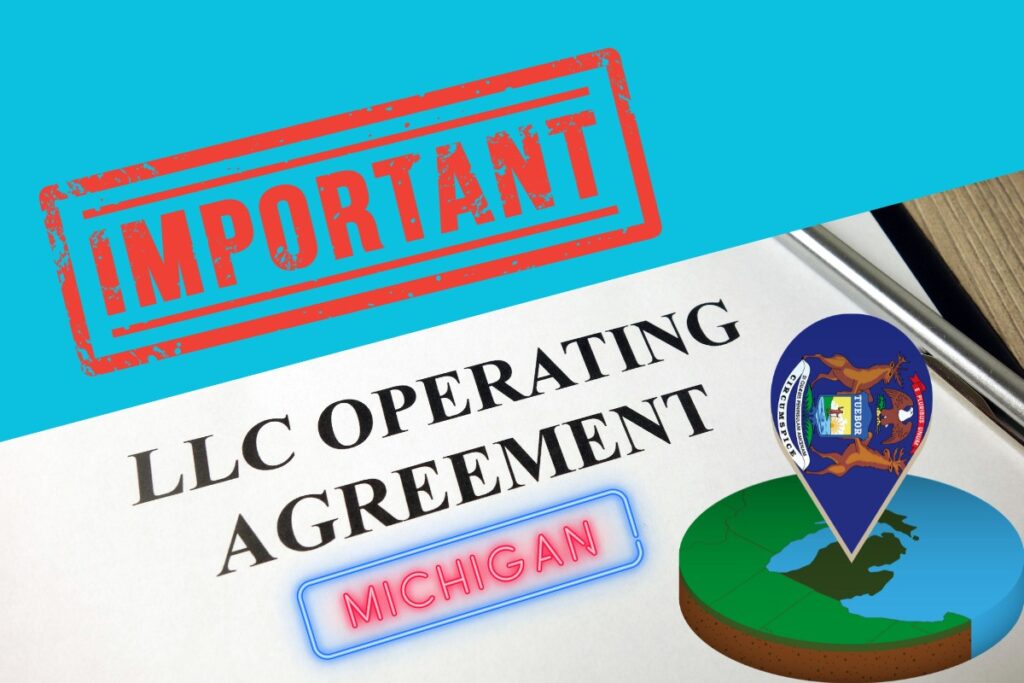
LLC operating agreements are a crucial internal document that outlines how the business is run and details everything from management structures to how profits are shared among members.
- It meticulously outlines the framework for managing business affairs, ensuring all members are aligned on the company’s operational direction and strategies.
- It crucially helps to prevent conflicts by clearly defining member responsibilities and agreements. In cases of conflict, the articles of organization prevail over the operating agreement.
- A written Operating Agreement is vital for any Michigan LLC, ensuring compliance with Michigan state law and the Limited Liability Company Act (LLCA), even though it’s not a legal requirement.
- Maintaining an up-to-date LLC operating agreement is essential for ensuring your business remains in good standing with Michigan state regulations.
- It helps business partners establish a solid business structure, including how to pay employees and manage the company according to specific operational needs. This agreement is crucial for directing the future actions and decisions of the Michigan LLC, making it an essential tool for guiding its governance.
- This agreement replaces basic legal rules, like how membership interests are given out (MCL 450.4505(1)), ensuring the Michigan LLC runs well and meets the unique needs of its members.
- Incorporating clear definitions of member roles and responsibilities in an LLC operating agreement is crucial to minimizing personal liability and protecting members under Michigan law.
- Including a section on the role and responsibilities of the registered agent in the LLC Operating Agreement is crucial for ensuring legal compliance and effective communication with the state.
- Financial institutions often require a comprehensive LLC Operating Agreement to open a business bank account, underscoring its importance in establishing the LLC’s banking relationships.
How do you Create an Operating Agreement for an LLC?
Establishing a comprehensive operating agreement is crucial for your Michigan LLC. Follow these steps to ensure clarity and effective governance:
1) Determine the Type of LLC Management:
- Decide whether your LLC will be member-managed (all members handle daily operations) or manager-managed (selected individuals or entities manage operations).
- For single-member LLCs, this decision impacts representation and operational dynamics.
- By default, Michigan LLCs are member-managed unless specified otherwise in the articles of organization (MCL 450.4401).
- Consider whether the LLC will have officers. If so, outline procedures for appointing and removing officers, as well as their roles, responsibilities, and authority in the operating agreement.
2) Designate a Registered Agent:
- Assign a registered agent to receive legal documents on behalf of the LLC, ensuring compliance with Michigan state requirements.
3) Outline Member Ownership Percentages and Contributions:
- Define capital contribution requirements for each member, which can include cash, assets, services, or promissory notes (MCL 450.4301(1)).
- Specify non-cash contributions and their valuation to avoid disputes.
- Reflect each member’s ownership percentage accurately to ensure fair profit distribution and voting rights.
- Include procedures for additional contributions, capital calls, and consequences of non-compliance (MCL 450.4302(3)).
4) Define Member Roles and Responsibilities:
- Clearly outline the rights and duties of members and managers.
- Establish standards for decision-making, honesty, and acting in the LLC’s best interest (MCL 450.4401 and 450.4402(1)).
- Consider including indemnification policies to protect members and managers from losses or claims, as permitted under MCL 450.4216 and 450.4407.
5) Specify Profit and Loss Distribution Procedures:
- Determine how profits and losses will be allocated based on contributions, ownership percentages, or a hierarchical waterfall provision.
- Include rules for distributions of cash or assets, ensuring transparency and fairness.
- For pre-July 1, 1997 LLCs, distributions are based on unreturned contributions (MCL 450.4303(1)).
6) Establish Rules for Adding or Removing Members:
- Outline procedures for admitting new members or handling member departures.
- Address scenarios like buy-sell agreements, death, or disability, ensuring unanimous consent for changes (MCL 450.4302).
7) Plan for Dissolution:
- Describe the steps for dissolving the LLC, including the distribution of assets after settling liabilities.
8) Consult a Professional:
- Have your operating agreement reviewed by a legal or tax professional to ensure compliance with Michigan laws and alignment with federal tax regulations.
By following these steps, you can create a robust operating agreement that promotes transparency, protects your LLC’s interests, and sets the stage for long-term success.
How to Amend an LLC Operating Agreement?
In Michigan, under the Limited Liability Company Act (LLCA), amending an LLC’s articles of organization is a streamlined process that involves filing a certificate of amendment with the Michigan Department of Licensing and Regulatory Affairs (LARA).
Amendments are permissible for any content that could legally be included in the initial articles of organization. Critical reasons for amending involve changes in the LLC’s name, purpose, management structure, maximum duration, and updating any false or erroneous statements.
A statement of change can be filed instead of a complete amendment for more straightforward updates like altering the registered office or resident agent. This flexibility allows LLCs in Michigan to adapt and update their foundational documents as their business evolves.
How will the Michigan LLC be Treated for US Federal Income Tax Purposes?
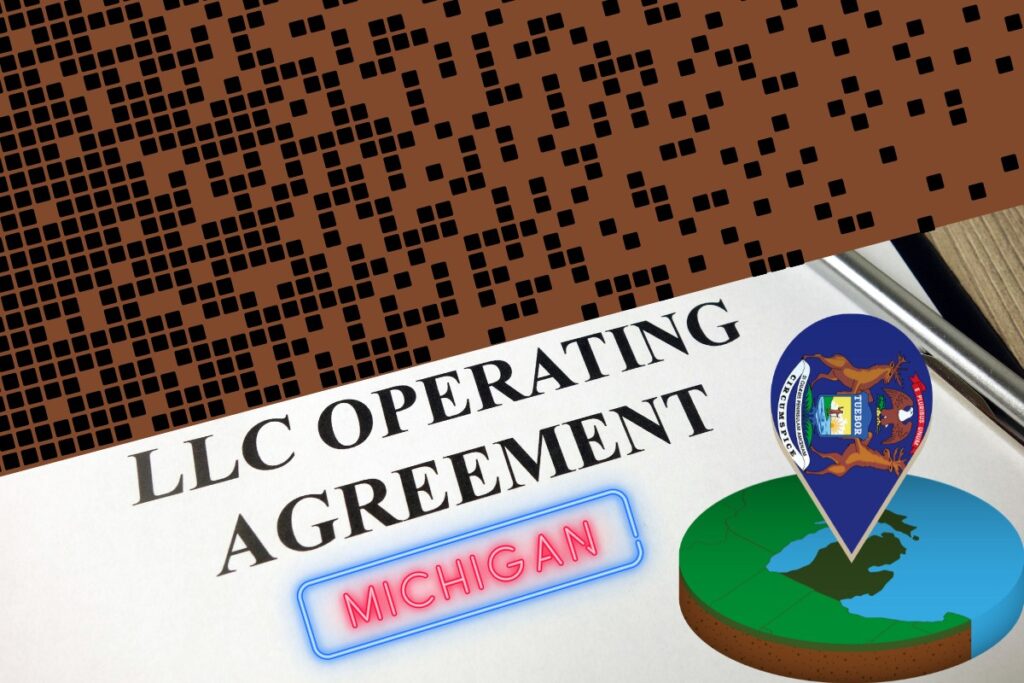
When forming an LLC, understanding its tax status is crucial for effective financial management. By default, unless an LLC opts to be taxed as a corporation, it’s treated as a pass-through entity, avoiding corporate-level taxes.
A single-member LLC is generally regarded as a sole proprietorship for taxation purposes. At the same time, a multi-member LLC is treated as a partnership.
Critical considerations in the LLC’s Operating Agreement include determining the fiscal year, appointing a partnership or tax matters representative, and outlining their duties, such as making tax elections, filing returns, and handling audits. The agreement may also set boundaries on the representative’s authority, requiring member notification and consent for significant tax-related decisions.
Additionally, obtaining an Employer Identification Number (EIN) is essential for the LLC, whether for opening a bank account, filing tax returns, or hiring employees. The Michigan Operating Agreement should also address tax withholding requirements, ensuring compliance with federal and state tax obligations.
How will the Michigan LLC Deal with Dissolution?

Member Vote Requirements for Dissolution
The dissolution of an LLC typically hinges on the member vote. Voluntary dissolution generally demands the approval of all eligible members. However, the articles of organization or operating agreement might specify a different requirement (MCL 450.4801(b), (c)).
An operating agreement allows dissolution approval through a supermajority or a simple majority vote. Furthermore, considerations may include the necessity of a specific member vote to revoke the dissolution decision, change the LLC’s duration, or modify the timeline for predetermined dissolution events.

Buy-Out Provisions and Judicial Dissolution
Operating Agreements often incorporate buy-out provisions to prevent dissolution in case of deadlock among members or between members and the LLC.
This means that operating agreements frequently include clauses that allow members to buy out each other’s interests to avoid having to dissolve or close the LLC if they can’t agree on important decisions.
These buy-out provisions act as a safety net, ensuring the business can continue even when members disagree significantly or can’t make joint decisions.
These provisions are particularly relevant if a member seeks court action for dissolution, which might arise if the LLC cannot continue business per its founding documents or if there’s evidence of illegal, fraudulent, or oppressive behavior by controlling members or managers (MCL 450.4802, 450.4515(1)(a)).

Succession Planning and Member Addition
A Michigan Operating Agreement must include succession plans or strategies for adding members, particularly in the event of the death or incapacity of the last or sole member.
The agreement may empower the final member’s legal representative or successor to continue the business or admit new members, as the LLCA doesn’t provide a default rule for such scenarios.

Designating a Liquidator for Winding Up
The operating agreement LLC template should designate who will handle the winding up and liquidation process – members, managers, or an appointed liquidator.
While this role typically falls to members or managers, the court may sometimes appoint a liquidator upon a member’s request (MCL 450.4805(1)).

Distribution of Assets Upon Liquidation
Finally, the operating agreement should specify how assets will be distributed during liquidation. Without specific provisions in the contract, any remaining assets after satisfying debts and liabilities are generally distributed to members according to their distribution shares (MCL 450.4808).
The agreement might propose distributions based on members’ capital account balances or another formula or the allocation of specific assets to designated members.
The practice note on dissolving an LLC in Michigan provides a more comprehensive understanding of LLC dissolution processes and considerations.
Why Should You Use FormPros’ Michigan LLC Operating Agreement Generator?
A free operating agreement generator simplifies the process of creating a comprehensive and legally compliant agreement for your Michigan LLC. Here are the key advantages of using FormPros:
1. Customization –
The generator creates an agreement tailored to your LLC’s unique requirements, ensuring all essential aspects of your business are covered.
2. Legal Compliance –
The tool ensures your operating agreement adheres to Michigan laws, providing peace of mind and helping you avoid potential legal issues.
3. Time and Cost Efficiency –
It offers a convenient and cost-effective alternative to hiring a lawyer, saving both time and money.
4. Simplicity and Accessibility –
The step-by-step interface makes the process straightforward and accessible, even for those without prior legal experience.
5. Protection for Members –
The generator helps establish clear roles, responsibilities, and profit-sharing arrangements, reducing the likelihood of disputes.
6. Professional Documentation –
By using the generator, you ensure your LLC’s operating agreement is well-documented and professionally organized.
Overall, FormPros’ Michigan LLC Operating Agreement generator is an excellent tool for business owners seeking a reliable, legally sound, and straightforward method to create an operating agreement tailored to their LLC’s specific needs.
Create A Michigan LLC Operating Agreement Now
State Specific LLC Operating Agreements
- Alabama
- Alaska
- Arizona
- Arkansas
- California
- Colorado
- Connecticut
- Delaware
- Florida
- Georgia
- Hawaii
- Idaho
- Illinois
- Indiana
- Iowa
- Kansas
- Kentucky
- Louisiana
- Maine
- Maryland
- Massachusetts
- Michigan
- Minnesota
- Mississippi
- Missouri
- Montana
- Nebraska
- Nevada
- New Hampshire
- New Jersey
- New Mexico
- New York
- North Carolina
- North Dakota
- Ohio
- Oklahoma
- Oregon
- Pennsylvania
- Rhode Island
- South Carolina
- South Dakota
- Tennessee
- Texas
- Utah
- Vermont
- Virginia
- Washington
- West Virginia
- Wisconsin
- Wyoming
Michigan LLC Operating Agreement FAQs
-
What is the role of the Commercial Licensing Bureau?
Involving regulatory affairs corporations in drafting your LLC Operating Agreement ensures compliance with Michigan's commercial licensing requirements and safeguards you against legal complications. The Commercial Licensing Bureau or the Corporations, Securities & Commercial Licensing Bureau (CSCL) oversees the licensing requirements for various businesses in Michigan, ensuring that LLCs comply with state-specific regulations.
-
Who Can Serve as a Registered Agent for My Michigan LLC?
In Michigan, your LLC must designate a registered agent responsible for receiving legal documents on behalf of the LLC. This agent can be an individual or a company officially authorized to conduct business in Michigan.
-
Can a Legal Business Entity Act as a Member of a Michigan LLC?
Yes, in Michigan, a legal business entity can indeed be a member of an LLC, contributing to the flexibility and broad participation options within the LLC structure.
-
What is the filing fee for an LLC Operating Agreement in Michigan?
The filing fee for an LLC Operating Agreement in Michigan is $50. This fee is for filing the articles of organization, which officially authorizes your LLC to operate in Michigan. Please note that this fee is non-refundable.
-
How does the Internal Revenue Service (IRS) classify an LLC in Michigan for tax purposes?
The IRS classifies an LLC in Michigan based on the number of members and the elections made by the LLC. A domestic LLC with at least two members is classified as a partnership for federal income tax purposes unless it files Form 8832 and elects to be treated as a corporation. An LLC with only one member is treated as an entity disregarded as separate from its owner for income tax purposes unless it files Form 8832 and elects to be treated as a corporation. However, an LLC with only one member is still considered separate for employment tax and certain excise taxes.
-
Do I Need to File My Michigan LLC Operating Agreement with the State?
You must not file your Michigan LLC Operating Agreement with the state. Even though you don't need to submit it to the Michigan Secretary of State, creating and maintaining an Operating Agreement is crucial. Keep it with your company records for reference.





